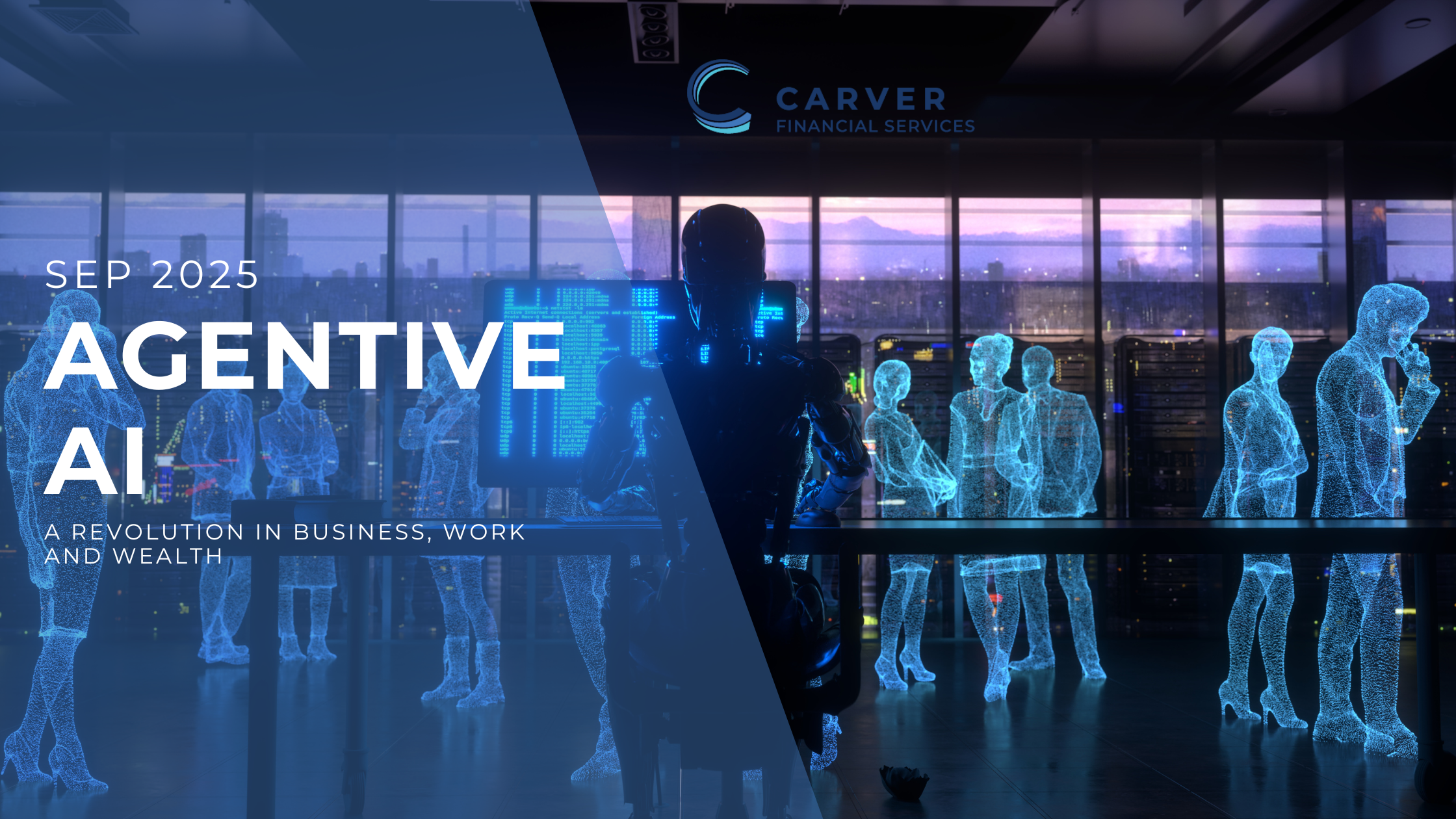
Since Carver Financial Services was founded in 1990, we’ve witnessed — and helped our clients navigate — some of the most fundamental shifts in modern history. We’ve been here through the creation of the internet, the widespread adoption of personal cell phones, the invention of social media and many other advances that have changed the way we live and work.
Through all this, one thing has remained constant: our commitment to using the latest tools to enhance — not replace — personal interaction. As we integrate cutting-edge technologies like agentive AI, we’re doing it with that same focus. Technology is a tool. People are the priority.
Here’s what you should know about the next major evolution in technology — and what it means for you.
What is agentive AI?
Agentive AI refers to systems that function not just as helpers, but as autonomous agents — taking action on your behalf, learning from experience and making decisions based on goals and context.
Whereas traditional AI responds to prompts at a point in time and generative AI answers questions, agentive AI acts autonomously to make recommendations and decisions. Think of it as the next step beyond traditional AI — like Siri, ChatGPT or Alexa. While those tools respond to prompts, agentive AI can do the following independently:
- Make decisions
- Complete tasks
- Learn and improve over time
- Coordinate with other systems or agents
In discussions about agentive AI, you’ll probably hear references to “AI agents,” which are sophisticated AI systems designed to reason, plan and execute tasks toward a specific goal, autonomously. AI agents often involve complex workflows and interactions with other systems. Unlike simple chatbots or automated tools, AI agents can operate with a degree of independence.
The terms can be confusing; there is agentic AI and agentive AI. Both concepts involve agents that act on behalf of a user. The main difference is that the agentic framework focuses on the “back stage” — how a user request is handled in the code — and the agentive framework focuses on the “front stage” — the user-experience implications of tasks being handled outside a user’s attention.
Agentive AI is already changing the way we go about our daily tasks. For example, home security systems can now distinguish among pets, swaying trees and potential intruders. Refrigerators now can detect the food stored inside and suggest recipes using those ingredients. Self-driving cars are already on the roads. Security companies are using facial recognition technology. And medical centers are more accurately predicting the odds of being diagnosed with specific conditions.
In financial management, AI uses advanced algorithms to analyze market trends and to identify investment opportunities that human analysts might miss. Investment firms use AI to track market sentiment in real time, predict price movements and identify investment risks.
Job losses vs. profit gains
As with every industrial or technological revolution — from the steam engine to the internet — there will be displacement; however, productivity will increase. Like every major innovation, agentive AI will have a dual impact.
On one hand, some jobs will be lost, particularly roles that require routine, repetitive work and don’t require creativity or complex judgment. A 2025 McKinsey report identified about one hour of daily activities that have the technical potential to be automated, and by 2030, the potential for automation could rise to three hours per day. This is not unlike what we saw during the rise of personal computing or the internet.
However, history shows us that while some jobs disappear as the result of advancing technology, others are created, and productivity skyrockets. Agentive AI is projected to boost output by 30 to 40 percent in certain sectors, driving higher profits and improved services. AI is augmenting the efforts of the human workforce, freeing people up to focus more on strategic and creative work and removing potential bottlenecks.
For businesses, it means doing more with less. For investors, it translates to greater earnings potential. And for society at large, it offers the possibility of more meaningful, creative work emerging in place of the mundane.
The bigger economic picture
Goldman Sachs projects that generative and agentive AI could add as much as $7 trillion to global GDP over the next decade. These gains are not isolated to Silicon Valley — they’re expected to touch nearly every industry: finance, health care, logistics, law and education.
The following are just some of the broader implications:
- A surge in new business models and services
- Expansion of AI-driven sectors ripe for investment
- A shift toward reskilling and workforce evolution
How Carver Financial Services is navigating this change
At Carver Financial Services, we’ve always embraced change with clarity and purpose. Our approach to AI and emerging technology is no different:
- We’re actively investing in the latest tech — but we do it to enhance our personal relationships, not to replace
- We’re expanding our team, even as we implement more automation and AI internally.
- We use technology to create efficiency behind the scenes so our team can spend more time building real connections and delivering customized solutions for you.
As with every past disruption — from dot-com booms to market crashes — there will be a lot of dire warnings in the media. We’re here to help you make informed, calm and strategic decisions.
What this means for you
If you’re a client, business owner or investor, here are some key takeaways:
- Stay invested in the future. The companies that are adopting and adapting to AI will likely lead the next wave of growth.
- Focus on adaptability. Whether you’re investing capital or planning your career, flexibility and a forward-looking mindset will serve you well.
- Know we’ve got your back. Our team is constantly educating ourselves on what’s changing — so you don’t have to do it alone.
Technology will continue to change — but our core values won’t. At Carver Financial Services, we’re committed to blending innovation with unmatched personal service.
Agentive AI is simply the next evolution, and with it comes great opportunity — not just for big companies, but for individuals who are willing to learn, adapt and invest wisely.
If you have questions about how these changes might affect your financial future — or if you just want to chat about what’s coming next — we’re here, as we have been since 1990, to help guide you forward.
Any opinions are those of Randy Carver and not necessarily those of Raymond James. This material is being provided for information purposes only and is not a complete description, nor is it a recommendation. The information has been obtained from sources considered to be reliable, but we do not guarantee that the foregoing material is accurate or complete.

 The Value of Personalized Advice
The Value of Personalized Advice













